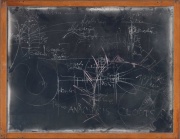Difference between revisions of "Blackboard chalk"
Jump to navigation
Jump to search
(username removed) |
|||
| (2 intermediate revisions by 2 users not shown) | |||
| Line 1: | Line 1: | ||
| − | [[File:2000.979-CR9834-d1.jpg|thumb|]] | + | [[File:2000.979-CR9834-d1.jpg|thumb|Untitled (Blackboard)<br>MFA# 2000.979]] |
== Description == | == Description == | ||
| − | A soft, chalky stick used to write on blackboards by students and teachers since the early 1800s. Blackboard chalk originally contained [ | + | A soft, chalky stick used to write on blackboards by students and teachers since the early 1800s. Blackboard chalk originally contained [[calcium carbonate]] typically bound with [[kaolin|kaolin clay]], [[oleic acid]], and [[sodium hydroxide]]. A wide variety of formulations are now used, most of which are made from calcium sulfate hemihydrate ([[plaster of Paris]]), which reacts with water to form [[gypsum]]. Dry pigments may be added for increased whiteness or coloration. |
== Synonyms and Related Terms == | == Synonyms and Related Terms == | ||
| Line 8: | Line 8: | ||
blackboard crayon | blackboard crayon | ||
| − | == | + | ==Resources and Citations== |
| − | * ''Encyclopedia Britannica'', http://www.britannica.com Comment: crayon." | + | * ''Encyclopedia Britannica'', http://www.britannica.com Comment: crayon." Accessed 10 Mar. 2005 . |
| − | * | + | * Answers.com at http://www.answers.com/topic/chalk |
| − | * | + | * Wikipedia: http://en.wikipedia.org/wiki/Chalk access March 10, 2005 |
* ''The Dictionary of Art'', Grove's Dictionaries Inc., New York, 1996 Comment: "Crayon" | * ''The Dictionary of Art'', Grove's Dictionaries Inc., New York, 1996 Comment: "Crayon" | ||
| − | * | + | * David Kearny, Conservator of Painted Surfaces, Australian War Memorial, Submitted information, Mar. 2005. |
[[Category:Materials database]] | [[Category:Materials database]] | ||
Latest revision as of 14:37, 8 May 2022
Description
A soft, chalky stick used to write on blackboards by students and teachers since the early 1800s. Blackboard chalk originally contained Calcium carbonate typically bound with kaolin clay, Oleic acid, and Sodium hydroxide. A wide variety of formulations are now used, most of which are made from calcium sulfate hemihydrate (Plaster of Paris), which reacts with water to form Gypsum. Dry pigments may be added for increased whiteness or coloration.
Synonyms and Related Terms
blackboard crayon
Resources and Citations
- Encyclopedia Britannica, http://www.britannica.com Comment: crayon." Accessed 10 Mar. 2005 .
- Answers.com at http://www.answers.com/topic/chalk
- Wikipedia: http://en.wikipedia.org/wiki/Chalk access March 10, 2005
- The Dictionary of Art, Grove's Dictionaries Inc., New York, 1996 Comment: "Crayon"
- David Kearny, Conservator of Painted Surfaces, Australian War Memorial, Submitted information, Mar. 2005.
